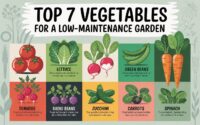Purple Bell Peppers: A Colorful Addition to Your Garden
Published: 2025-10-18
Purple bell peppers are not only visually stunning but also packed with nutrients and flavor. These vibrant vegetables add a splash of color to your garden and your plate. Whether you are a beginner gardener or a seasoned grower, learning how to grow purple bell peppers can elevate your gardening experience.
This guide will walk you through everything you need to know—from planting and care to harvesting and health benefits. Along the way, we’ll use high-volume keywords like how to grow purple bell peppers, purple bell pepper benefits, and colorful vegetables for garden to ensure this content is fully optimized for search engines.
Why Choose Purple Bell Peppers
Purple bell peppers are a unique variety of sweet peppers. Their deep violet skin and crisp texture make them a favorite among gardeners and chefs alike. But their appeal goes beyond appearance.
- They are rich in antioxidants
- They contain vitamins A and C
- They are low in calories and high in fiber
- They support immune health and eye function
Because of these benefits, purple bell peppers are often included in lists of vegetables that boost immunity and nutrient-dense garden crops.
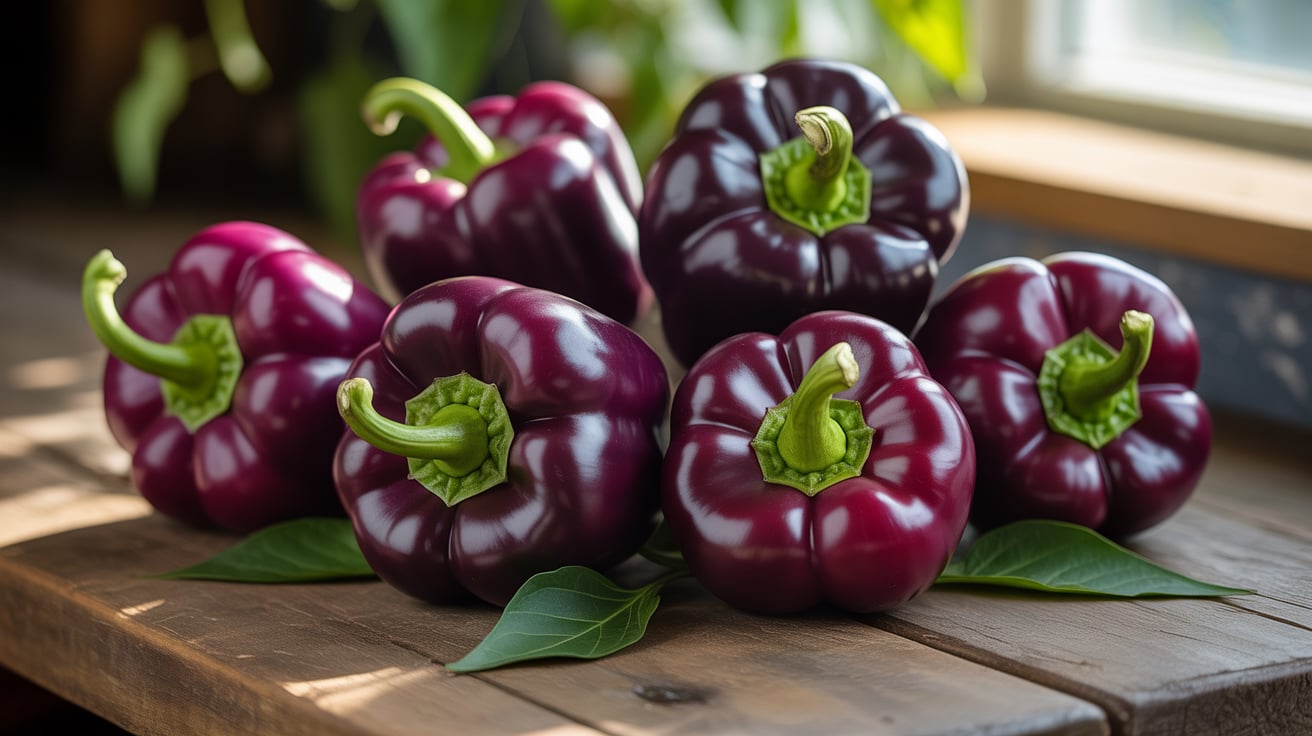
Nutritional Profile of Purple Bell Peppers
Purple bell peppers are loaded with essential nutrients. Their vibrant color comes from anthocyanins, which are powerful antioxidants. These compounds help fight inflammation and protect cells from damage.
| Nutrient | Amount per 100g | Health Benefit |
|---|---|---|
| Vitamin C | 80 mg | Boosts immunity and skin health |
| Vitamin A | 370 IU | Supports vision and cell growth |
| Fiber | 2.1 g | Aids digestion and gut health |
| Anthocyanins | Present | Reduces inflammation and oxidative stress |
These peppers are a smart choice for anyone looking to grow healthy vegetables at home.
Best Soil and Climate for Purple Bell Peppers
Purple bell peppers thrive in warm, sunny conditions. They prefer well-drained soil that is rich in organic matter. The ideal pH range is between 6.0 and 6.8.
Soil preparation tips:
- Add compost or aged manure before planting
- Ensure soil is loose and well-aerated
- Avoid waterlogged areas
Climate needs:
- Full sun (at least 6 hours daily)
- Daytime temperatures between 70°F and 85°F
- Night temperatures above 55°F
Because they are sensitive to cold, purple bell peppers should be planted after the last frost.
How to Grow Purple Bell Peppers from Seeds
Starting from seeds allows you to control the growing process from the beginning. It also gives you access to more varieties.
Steps to grow from seeds:
- Start seeds indoors 8–10 weeks before the last frost
- Use seed trays with a light potting mix
- Keep soil moist and warm (70–80°F)
- Transplant seedlings when they have 2–3 true leaves
Transplanting tips:
- Harden off seedlings before moving them outside
- Space plants 18–24 inches apart
- Water thoroughly after transplanting
This method ensures strong root development and healthy growth.
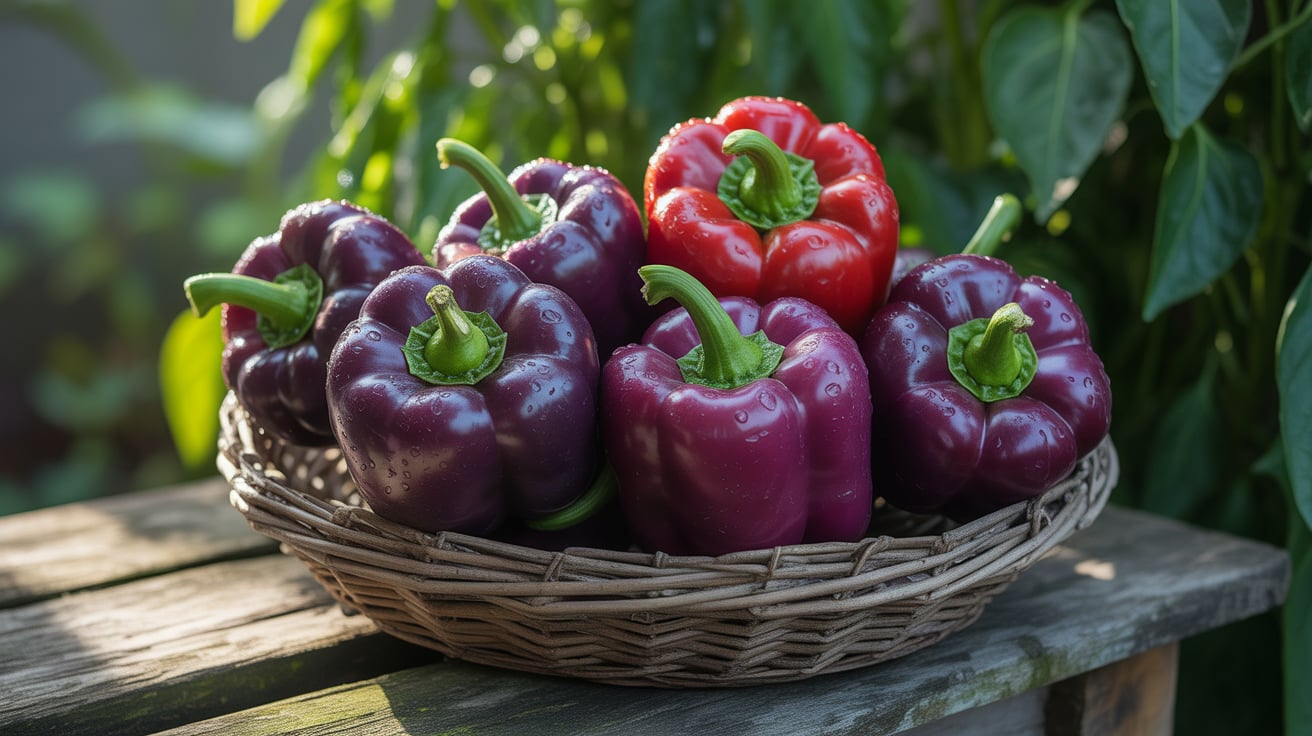
Caring for Purple Bell Pepper Plants
Proper care is essential for a bountiful harvest. These peppers need consistent moisture and nutrients.
Watering:
- Water deeply once or twice a week
- Avoid overhead watering to prevent disease
- Use mulch to retain moisture
Fertilizing:
- Apply balanced fertilizer every 3–4 weeks
- Use compost tea or fish emulsion for organic feeding
- Avoid high-nitrogen fertilizers that promote leaves over fruit
Pruning:
- Remove lower leaves to improve airflow
- Pinch off early flowers to encourage root growth
Healthy plants produce more peppers and resist pests better.
Common Pests and Diseases
Although purple bell peppers are hardy, they can still face challenges. Early detection and natural remedies are key.
| Problem | Symptoms | Solution |
|---|---|---|
| Aphids | Sticky residue, curled leaves | Neem oil, insecticidal soap |
| Blossom end rot | Dark spots on fruit | Add calcium, maintain moisture |
| Spider mites | Fine webbing, yellow leaves | Spray with water, use neem oil |
| Bacterial spot | Water-soaked lesions | Remove infected leaves, rotate crops |
Regular inspection helps keep your garden healthy and productive.
Harvesting and Storing Purple Bell Peppers
Purple bell peppers can be harvested when they reach full size and color. They are typically ready 70–90 days after transplanting.
Harvesting tips:
- Use scissors or pruners to avoid damaging the plant
- Pick peppers when they are firm and fully colored
- Harvest regularly to encourage more fruit
Storage tips:
- Store in the refrigerator for up to 2 weeks
- Do not wash until ready to use
- Freeze chopped peppers for long-term storage
Proper harvesting and storage preserve flavor and nutrients.
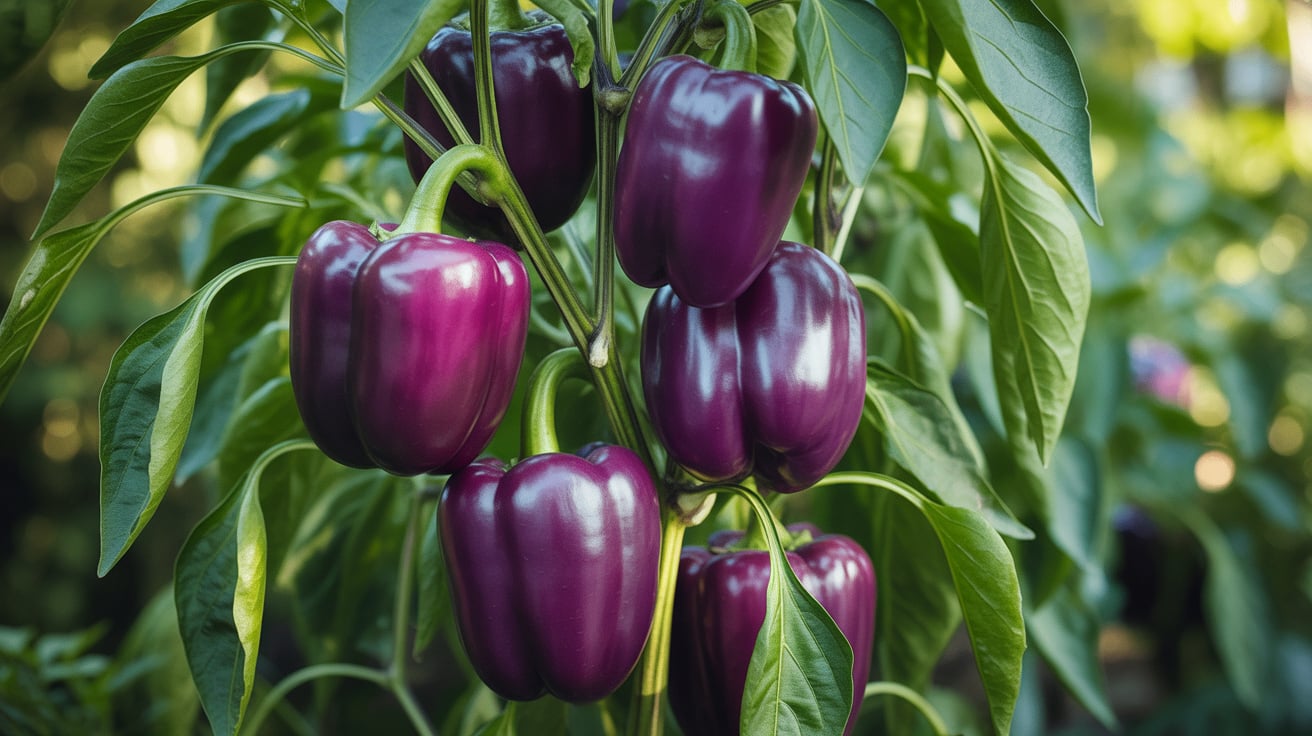
Culinary Uses of Purple Bell Peppers
These peppers are not just pretty—they are delicious too. Their mild, sweet flavor makes them versatile in the kitchen.
Popular uses:
- Raw in salads and wraps
- Roasted or grilled as a side dish
- Stuffed with rice or quinoa
- Sautéed in stir-fries and pasta
Because of their color, they also make beautiful garnishes and party platters.
Companion Planting with Purple Bell Peppers
Companion planting improves growth and deters pests. Purple bell peppers benefit from being near certain plants.
| Good Companions | Benefits |
|---|---|
| Basil | Repels aphids and spider mites |
| Marigolds | Deter nematodes and beetles |
| Onions | Mask scent from pests |
| Carrots | Improve soil aeration |
Avoid planting near:
- Fennel (inhibits growth)
- Beans (compete for nutrients)
Strategic planting leads to a healthier and more productive garden.
Growing Purple Bell Peppers in Containers
If space is limited, container gardening is a great option. Purple bell peppers grow well in pots with proper care.
| Container tips: |
|---|
Container-grown peppers are easy to manage and move indoors if needed. |
Saving Seeds for Next Season
Saving seeds allows you to grow your favorite variety again. It also saves money and promotes sustainability.
Steps to save seeds:
- Choose a fully ripe pepper
- Cut open and remove seeds
- Dry seeds on a paper towel for 1–2 weeks
- Store in a labeled envelope in a cool place
Seeds remain viable for up to 3 years if stored properly.
Health Benefits of Purple Bell Peppers
These peppers are more than just a pretty face. They offer a range of health benefits.
| Health Benefit | How It Helps |
|---|---|
| Boosts immunity | High vitamin C content |
| Supports eye health | Rich in vitamin A and carotenoids |
| Fights inflammation | Contains anthocyanins and antioxidants |
| Aids digestion | High in dietary fiber |
Including them in your diet supports overall wellness.
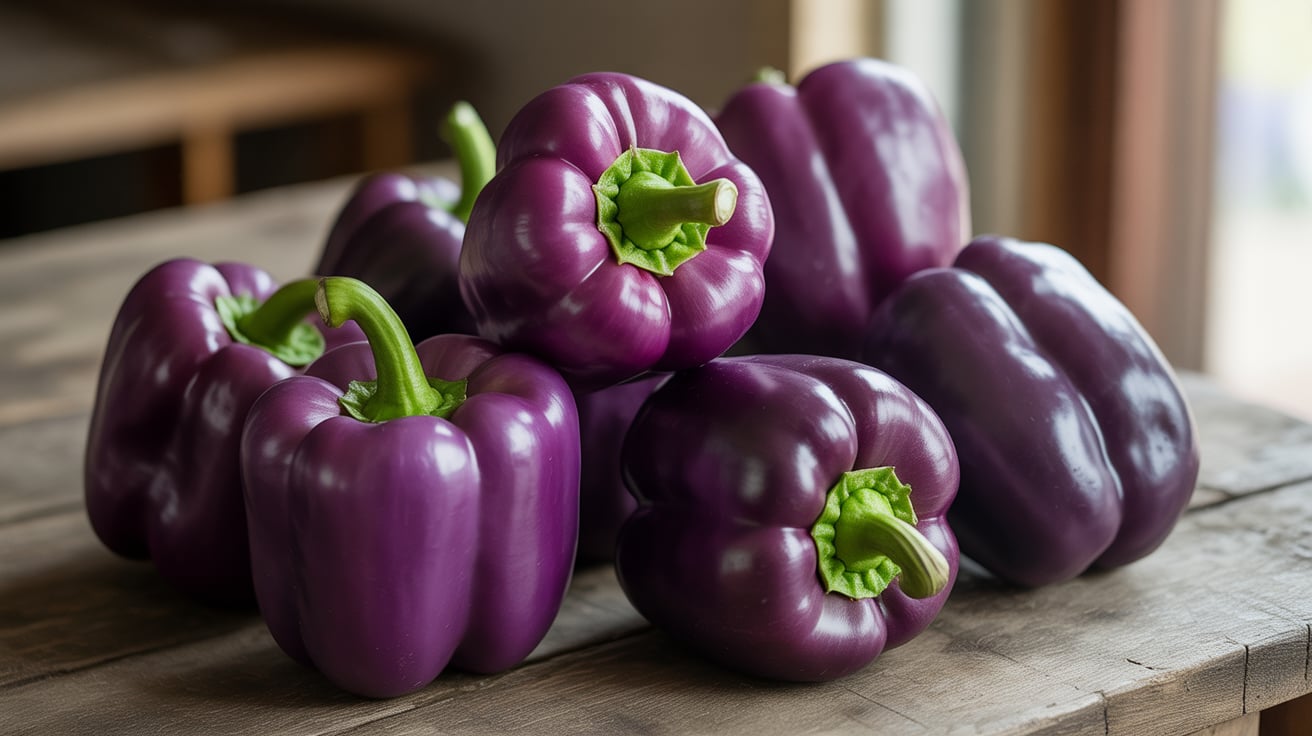
Frequently Asked Questions (FAQs)
They are natural and developed through selective breeding.
Yes, they are sweeter and milder than green peppers.
They mature in about 70 to 90 days after transplanting.
Yes, if you provide enough sunlight or use grow lights.
Yes, they are low in calories and high in fiber.

- Be Respectful
- Stay Relevant
- Stay Positive
- True Feedback
- Encourage Discussion
- Avoid Spamming
- No Fake News
- Don't Copy-Paste
- No Personal Attacks



- Be Respectful
- Stay Relevant
- Stay Positive
- True Feedback
- Encourage Discussion
- Avoid Spamming
- No Fake News
- Don't Copy-Paste
- No Personal Attacks


